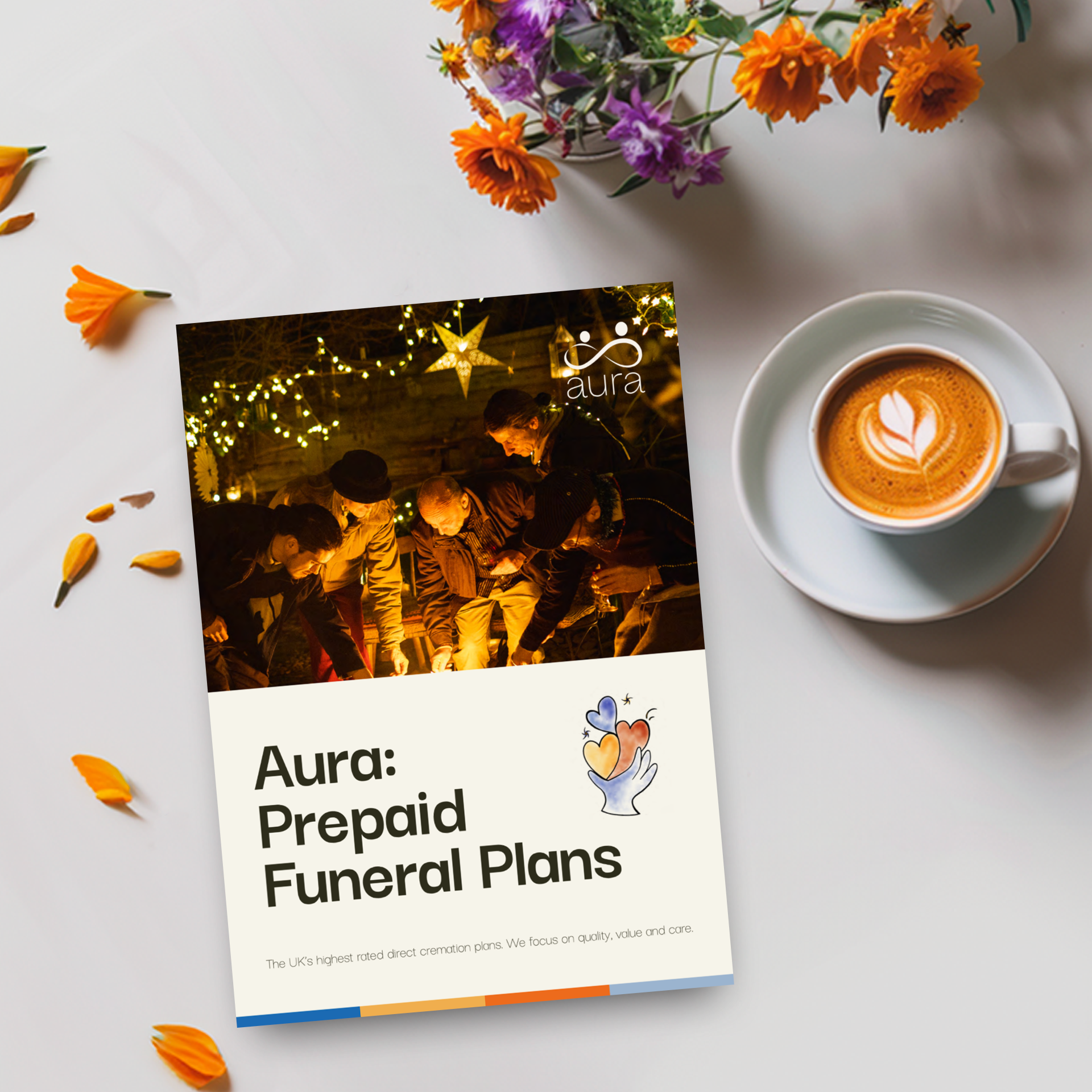


Written by Emily Cross.
15 minute read

When a close friend dies, it can feel like losing a member of your own family. You’ve likely shared years of laughter, comfort, and memories that even your relatives might not have known about. You may have grown up side by side, been there through milestones and quiet moments alike. The death of a long-time friend can be overwhelming to take in, but there are small, gentle steps you can take now that might make the months ahead feel a little less heavy.
As specialists in providing direct cremation services, we speak with kind-hearted people who are attempting to process grief and death on a daily basis. Our goal is always to listen, validate, and then help with any of the practical arrangements where you feel we can help. We also know that as a friend and not immediate family, you might not have much say in how the funeral or memorial is arranged.
To help you process how all of this may make you feel, we’ve put together a guide that will present you with ideas and coping mechanisms when you are remembering a friend. We hope that it provides you with a sense of support at what may be a difficult time.
Key takeaways:

The act of remembering a loved one is something that we all have the right to make, and it’s something that will take a variety of different forms depending on your individual relationship. Some people find comfort in meaningful grief and loss quotes about the death of a friend. Others might choose to create a memorial, while some keep their feelings private for a while. However you cope, it’s valid… and exploring different ways to reflect might help you understand what you’re feeling right now.
Take the first birthday after the death of a loved one as an example, and then think about how you might want to work through it. A common approach is to recall meaningful moments and shared experiences with a group of people who knew the person who died.
Talking about your friend’s personality, humour, and kindness may help you feel a lasting connection with them and show you that even in death, there are things about them that can make you smile. Little things such as photos, mementos, and keepsakes may help keep memories alive and give you additional space to process how you are feeling.
Others prefer to think about writing a personal tribute or a heartfelt condolence message. It could be for a memorial service or social media, or it could remain private. A common approach here is to focus on expressing what your friend meant to you and how they impacted the lives of people they met. If you like this idea but are not comfortable with putting your pen to paper, trying to come up with comforting, heartfelt language that reads like you are speaking directly to them may help you.
Writing a tribute to a friend you’ve lost might come easily, or it might take time to find the right words. Both are completely okay. Some may find that they start to develop feeling energy when someone dies while others may feel disconnected and despondent. The point is that no matter how you approach things and how you feel, your path is valid. Taking a moment to consider a few different routes may help.
Finding a quote that speaks to your heart and means something to you on a variety of levels may help you to express yourself. Here are a few timeless options you may wish to consider:
There is always the option to adapt a similar quote so that it aligns with your relationship and what you and your friend meant to one another. Giving yourself permission to express yourself in this way may also help you to process some of the emotions that could be still sitting under the surface.
Wanting to pay a short tribute to a friend who passed away is something that we completely understand. In our role as a family-run funeral provider, we have the honour of hearing and reading many such tributes. Here are some that you may wish to use as a starting point:
By using language that balances grief and gratitude, these types of messages allow you to express yourself while processing your emotions and honouring the legacy of a dear friend. You may also find that they provide comfort to other mourners who read your words.
Paying a tribute to a friend who passed away may also involve sitting and considering the many different symbols of grief. Taking a moment to reflect on some of the habits, traditions, and rituals that are out there may allow you to find something that symbolises how you feel and the sense of loss you are experiencing.
Creating memory books with friends and relatives could help to process how you feel while at the same time giving you something to look back on in the months and years ahead. It’s also a chance to share ideas and memories with other people who knew and cared about your friend.
There is also a lot to be said for planting a memorial tree because it allows you to have a permanent place to come when you want to reflect on your friend’s legacy. To many, the growth of the tree symbolises the fact that their friend continues to live on after death as a consequence of having touched lives.
Another option is the annual hosting of a remembrance event, such as a celebration of life, that combines time for quiet reflection and solace with a more social, celebratory atmosphere later on. This could be a great way to bring people together, keep other friendships alive, and make sure that everyone feels supported and cared for. You may also find that organising the event each year provides a welcome distraction if you are someone who benefits from staying busy.
You might find that you want to be able to start talking about death and dying, but, right now, it feels more comfortable to do something practical. There is nothing wrong with this and you have every right to process the death of a friend in a way that you feel comfortable with.
Some find that commissioning a dedicated memorial bench helps provide a point of focus and serves as a visual symbol of their love for their friends. Others look at endowing a scholarship so that they can give back to the next generation in the name of their friend. Another popular option is to set up and run an online tribute page where friends and relatives can stop by to share memories on key dates and anniversaries.
Another approach you may find insightful is focusing on group activities. Organising walks, gatherings, or fundraisers in your friend’s name may help you to feel like you are still connected with them and they are still making their presence felt in the world. Exactly what you want to hear when you’re looking to find a new way to express yourself.
Remembering a friend who has died is a deeply personal journey that may often make you feel like you are taking one step forward and two steps back. The act of remembrance may be a positive time of celebration, but then later you may feel like you are unable to cope. The rapidly changing nature of intense emotion is something that it is perfectly understandable to struggle with.
One of the healthiest things you can do as someone who is responsible for practicing self-care at this time is to validate how you feel. Acknowledging that you are going to experience deep sadness, intense shock, and perhaps even prolonged feelings of emptiness after the death of a friend may help you to come to terms with what has happened.
Many find that missing a close friend is as profound as a familial loss and this is understandable considering how close the two of you may have been. It also makes sense if you feel that you cannot burden the close family with how you feel and, as a result, feel some degree of guilt for feeling the way you do. The point to remember is that you have every right to feel this way and that no one who knows you will begrudge you.
It might help to remind yourself that grief often comes in waves. Some moments can feel unbearable, while others pass with a strange sense of calm. Healing after the loss of a friend doesn’t follow a straight path, there’ll be good days, bad days, and days that simply hurt. That’s all part of how grief moves.
If you have mutual friends, staying connected and leaning on each other may help you build your own network without feeling like you are leaning too much on their close family. Mutual support fosters healing and remembrance and allows you to share memories of the person you have all lost from your lives.
Little things like organising an informal group gathering the first time you have to try navigating birthdays, anniversaries, and other key milestones may really help. If nothing else, you will have the reassurance that comes from knowing other people you know are going through exactly the same range of emotions. You are not alone and you also have the power to help others heal. Realising this is something you may find empowering to the point where it helps you heal too.
Exercising your creative powers in memory of a friend who has died is one of the most effective approaches for anyone wanting to know how to deal with grief. By allowing yourself to express yourself in a way you feel comfortable with, you grant yourself the time and space to grieve in a way that feels right.
Writing a poem or a letter is something that you may feel allows you to express your love and grief in a personal way. If you don’t want to share what you have written, keeping a journal is another way to use your creativity with pen and paper to start processing your feelings.
Embracing personal writing that feels like it comes from the heart and directly addresses your friend may help you process emotions and strengthen the connection you feel. This makes it a healthy, emotionally sustainable habit that shouldn’t risk burning you out or proving too much during those times when you are experiencing more intense emotions.
For many people, posting a tribute on social media has become a meaningful way to remember a friend. Sharing a few photos along with a personal memory is a common and heartfelt gesture.
While everyone has the right to grieve in their own way, it’s worth remembering that your post might be seen by close family members who experienced a different side of your friend. Taking a moment to pause and reflect before posting can help you strike the right balance between honesty and sensitivity.
We all have to work through the five stages of grief if we are going to come out the other side emotionally ready to continue with life. We each have the right to remember and, to all of us, it is a central part of the healing journey we find ourselves on.
Friends, family, and community members all grieve differently, and that’s perfectly understandable given the different relationships they will have had with your dear friend. As a friend, you will have different memories of them than their parents or siblings, for example. You may find that making a virtue of this fact and coming together to celebrate their life can really help you and all those in attendance.
However you choose to remember your friend, try to be gentle with yourself. Some days you might feel guilty for carrying on with everyday life. Other days, it might feel impossible to get through. You’re not alone…many people feel the same way when someone they love dies. These shifting emotions are part of grief, and they exist because you loved deeply. That love is still with you, even now.
We want you to know that we are always here for you, no matter at which stage of your grieving and healing journey you find yourself. Many people we speak to find that the death of a dear friend forces them to think about their own life and legacy and what they may leave behind. With this in mind, you may wish to know that we offer *prepaid funeral plans and guides that *compare funeral plans when you feel emotionally ready.
We hope that you have found some words of comfort and support in our guide and that it can go some way to helping you heal. The journey may take longer than you think and send you on unexpected detours, but you will get there if you keep being kind to yourself. You have the right to heal and grieve in your own way and at your own pace, and no one will ever judge you for it.
*Terms and conditions apply. You will receive a funeral plan summary before purchase.

Our brochure includes all the details you need surrounding our prepaid direct cremation funeral plans.
Get your free brochure sent by email or First Class post by clicking on the link below.
This a personal question that has a limitless number of answers. The key point is that you always have the right to commemorate a friend’s first death anniversary in a way you see fit. Some like to sit and reflect alone, others enjoy the social element of a memorial, and then there are many who find that taking a trip with a smaller group helps. Finding something that feels right to you and your fellow mourners may help you to process your emotions on a deeper level.
You might plant a tree, write a letter to them, share a favourite memory online, or start a small tradition like lighting a candle on their birthday. What matters is that it feels true to your bond and brings comfort.
Yes. Many people now turn to social media to share their grief and memories. A few words and a photo can be a touching tribute. Just take a moment to consider how close family may feel,pausing before posting can help you strike the right tone.
You can share a story, express what they meant to you, or simply say how much they’re missed. It doesn’t need to be long or poetic—just honest.
Of course. You don’t need to be a family member to create meaning. You could visit a place you shared, start a creative project, or simply take a quiet moment to remember them. Every gesture counts.
Completely. Grief often comes in waves. You might feel okay one moment and lost the next. That’s part of how loss works, there’s no fixed pattern.
Reach out, listen, and share. Sometimes the quietest forms of support—just being there—are the most meaningful. Grief can feel less lonely when it’s shared.
Yes. You could make a playlist, write something down, gather a few friends, or keep a photo nearby. Personal acts of remembrance are always meaningful, no matter how simple.
That’s okay too. There’s no timeline for grief. You can take your time and come back to things when you feel able. Your love doesn’t depend on how quickly you act.
staging site last replicated: MISSINGNO.